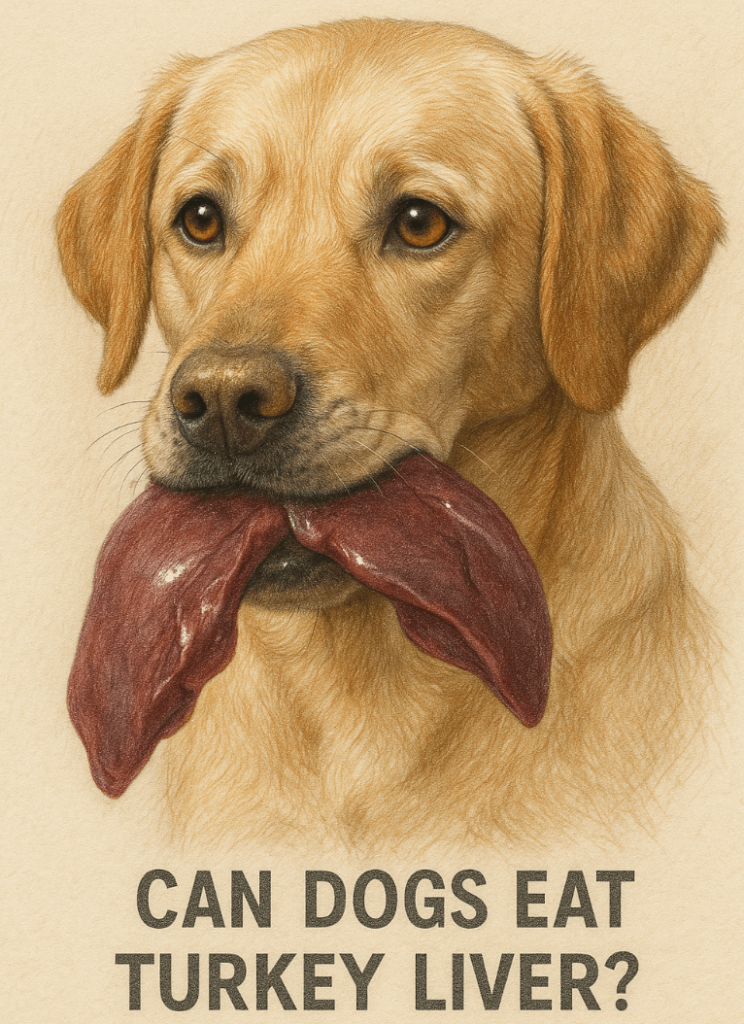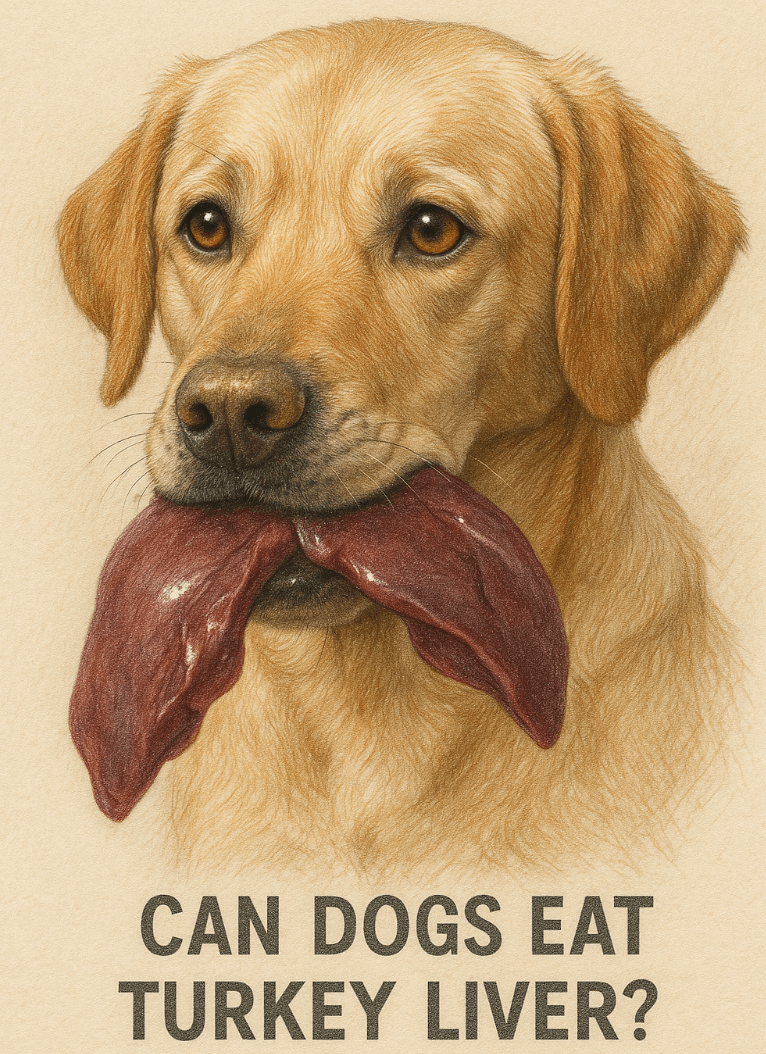Can Dogs Eat Turkey Liver?
Turkey liver is a nutrient-rich food that many dog owners consider adding to their pet’s diet. Packed with essential vitamins and minerals, it can be a healthy treat when prepared correctly. However, like any human food, turkey liver should be given in moderation and with careful consideration of your dog’s dietary needs. While it offers numerous health benefits, there are also potential risks if not fed responsibly. In this blog post, we’ll explore everything you need to know about feeding turkey liver to your dog, including its nutritional value, safe preparation methods, and what to watch out for. By the end, you’ll have a clear understanding of whether turkey liver is a good addition to your furry friend’s diet.
Nutritional Benefits of Turkey Liver for Dogs
Turkey liver is a powerhouse of nutrients, making it a valuable addition to your dog’s diet when served in moderation. Here are some of the key benefits it provides:
Rich in Protein:
Turkey liver is an excellent source of high-quality protein, which supports muscle growth, repair, and overall energy levels.Packed with Vitamins:
It contains essential vitamins like A, B12, and folate, which promote healthy vision, nerve function, and red blood cell production.High in Iron:
Iron from turkey liver helps prevent anemia by supporting oxygen transport in the blood.Omega-3 Fatty Acids:
These healthy fats contribute to a shiny coat, reduced inflammation, and improved joint health.Minerals for Bone Health:
Turkey liver provides minerals like zinc and copper, which support strong bones and a robust immune system.
When fed responsibly, turkey liver can be a nutritious treat that enhances your dog’s overall well-being.
Potential Risks of Feeding Turkey Liver to Dogs
While turkey liver has many benefits, overfeeding or improper preparation can lead to potential health issues. Understanding these risks ensures you keep your dog safe while introducing this food.
Vitamin A Toxicity:
Excessive vitamin A from overfeeding liver can cause toxicity, leading to symptoms like lethargy, bone pain, and digestive upset.High Fat Content:
Turkey liver is relatively fatty, which may upset sensitive stomachs or contribute to pancreatitis in predisposed dogs.Risk of Contaminants:
If the liver isn’t sourced from a reputable supplier, it may contain harmful toxins or pathogens that could make your dog sick.Imbalanced Diet:
Feeding too much liver as a regular part of the diet can disrupt nutritional balance, especially if other essential nutrients are neglected.Choking Hazard:
Large chunks or improperly prepared pieces of liver can pose a choking risk, particularly for smaller dogs.
By being mindful of these risks, you can ensure that turkey liver remains a safe and beneficial occasional treat for your dog.
Check this guide 👉Can Dogs Eat Cornmeal? Best 7 Expert Tips!
Check this guide 👉Can Dogs Eat Feta? Best 7 Expert Tips!
Check this guide 👉Can Dogs Eat Frogs? Best 7 Expert Tips!

Benefits of Turkey Liver for Dogs | Risks of Feeding Turkey Liver to Dogs |
|---|---|
High in protein for muscle health | Risk of vitamin A toxicity if overfed |
Rich in iron to prevent anemia | High fat content may upset digestion |
Packed with essential vitamins | Potential contaminants in poor-quality liver |
Supports a shiny coat and skin | Can disrupt nutritional balance |
Promotes strong bones and immunity | Choking hazard if not prepared properly |
How to Safely Prepare Turkey Liver for Your Dog
Preparing turkey liver correctly is crucial to ensuring your dog enjoys it safely. Follow these steps to minimize risks and maximize nutritional benefits.
Choose Fresh, High-Quality Liver:
Opt for organic or grass-fed turkey liver from trusted sources to avoid harmful additives or contaminants.Cook Thoroughly:
Raw liver can carry bacteria like Salmonella; cook it thoroughly without added oils, spices, or seasonings.Cut into Bite-Sized Pieces:
Slice the liver into small, manageable portions to reduce the risk of choking, especially for smaller breeds.Serve in Moderation:
Limit servings to once or twice a week, ensuring it doesn’t exceed 5-10% of your dog’s total diet.Monitor for Allergies:
Introduce turkey liver gradually and observe your dog for signs of allergic reactions, such as itching or vomiting.
With proper preparation, turkey liver can be a safe and nutritious addition to your dog’s diet.
Signs Your Dog May Have Eaten Too Much Turkey Liver
Overfeeding turkey liver can lead to adverse effects, so it’s important to recognize the warning signs early. If you notice any of these symptoms, consult your veterinarian promptly.
Lethargy or Weakness:
Excessive vitamin A can cause fatigue and general weakness in dogs.Digestive Upset:
Vomiting or diarrhea may indicate that your dog’s stomach is struggling to process the liver.Bone Pain or Stiffness:
Vitamin A toxicity can lead to skeletal issues, causing discomfort or difficulty moving.Loss of Appetite:
A sudden refusal to eat may signal an underlying issue caused by overconsumption of liver.Jaundice or Yellowing of Skin/Gums:
This could indicate liver-related problems stemming from an imbalanced diet.
Being vigilant about these signs ensures you can address any issues before they escalate.
Common Mistakes to Avoid When Feeding Turkey Liver
Feeding turkey liver to your dog requires careful planning to avoid mistakes that could harm their health. Here are some common pitfalls to watch out for.
Overfeeding:
Giving too much turkey liver frequently can lead to vitamin A toxicity or nutritional imbalances.Adding Seasonings or Spices:
Ingredients like garlic, onions, or salt can be toxic to dogs and should never be used in preparation.Serving Raw Liver:
Raw liver carries a risk of bacterial contamination, so cooking is essential for safety.Neglecting Portion Control:
Even healthy foods can cause weight gain or digestive issues if portions aren’t carefully measured.Ignoring Individual Dietary Needs:
Some dogs may have sensitivities or medical conditions that make turkey liver unsuitable for them.
Avoiding these mistakes ensures a safer and healthier experience for your dog.
Alternative Nutritious Treats for Dogs
If turkey liver isn’t suitable for your dog or you’d like to diversify their treats, there are plenty of alternatives that offer similar nutritional benefits.
Chicken Hearts:
A lean, protein-rich option that’s easier to digest for some dogs compared to liver.Boiled Eggs:
Eggs are packed with protein and biotin, promoting healthy skin and fur.Pumpkin Puree:
Rich in fiber, pumpkin aids digestion and can help regulate bowel movements.Carrots:
Low-calorie and crunchy, carrots are great for dental health and provide vitamin A.Blueberries:
These antioxidant-rich berries make a sweet, low-calorie snack for dogs.
These alternatives allow you to cater to your dog’s dietary preferences while keeping them healthy.
Tips for Introducing New Foods to Your Dog’s Diet
Introducing new foods like turkey liver requires a cautious approach to ensure your dog tolerates them well. Here are some tips to make the transition smoother.
Start Small:
Begin with tiny portions to gauge how your dog reacts before increasing the amount.Observe for Reactions:
Watch for signs of allergies, such as itching, swelling, or gastrointestinal upset, after introducing a new food.Maintain Balance:
Ensure new additions don’t replace essential nutrients already present in your dog’s regular diet.Consult Your Vet:
Always seek professional advice before making significant changes to your dog’s diet.Keep a Food Diary:
Track what you feed your dog and note any positive or negative changes in behavior or health.
By following these tips, you can safely expand your dog’s palate while prioritizing their well-being.
Frequently Asked Questions About Feeding Turkey Liver to Dogs
How much turkey liver can I feed my dog?
Limit portions to no more than 1-2 teaspoons per 10 pounds of body weight, once or twice a week.
Can puppies eat turkey liver?
Yes, but only in very small amounts and under veterinary supervision to avoid nutritional imbalances.
Is raw turkey liver safe for dogs?
No, raw liver can harbor harmful bacteria; always cook it thoroughly before serving.
What should I do if my dog eats too much turkey liver?
Contact your veterinarian immediately to assess potential toxicity or other complications.
Can dogs with allergies eat turkey liver?
Dogs with known poultry allergies should avoid turkey liver; otherwise, introduce it gradually to monitor reactions.
Balancing Nutrition and Safety When Feeding Turkey Liver
Turkey liver can be a nutritious and tasty treat for dogs when offered in moderation and prepared correctly. Its rich nutrient profile makes it an excellent supplement to a balanced diet, but overfeeding or improper handling can lead to health issues. By understanding the benefits, risks, and best practices for feeding turkey liver, you can provide your dog with a safe and enjoyable culinary experience. Always prioritize your dog’s individual needs and consult your veterinarian if you’re unsure about incorporating new foods into their diet. With care and attention, turkey liver can become a healthy addition to your dog’s menu.
Do Cats Have Taste Buds? Best 7 Expert Tips! – Discover how cats experience flavors and why their taste is so unique.
Do Dogs Have Taste Buds? Best 7 Expert Tips! – Discover how dogs experience taste, their preferences, and what it means for their diet and health.
Can Cats Taste Sweet? Best 7 Expert Tips! – Discover why cats can’t taste sweetness, how it affects their diet, and tips to keep them healthy and happy.
Can Dogs Taste Sweet? Best 7 Expert Tips! – Discover how dogs perceive sweetness, which foods are safe, and tips to manage their sweet cravings responsibly.





